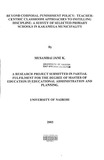| dc.contributor.author | Musambai, Jane K | |
| dc.date.accessioned | 2013-04-30T12:03:03Z | |
| dc.date.available | 2013-04-30T12:03:03Z | |
| dc.date.issued | 2003 | |
| dc.identifier.citation | Masters Thesis, University of Nairobi | en |
| dc.identifier.uri | http://erepository.uonbi.ac.ke:8080/xmlui/handle/123456789/18034 | |
| dc.description.abstract | This study set out to examine the operationnalization of the government policy outlawing corporal punishment in schools. It specifically sought to examine the formulation and implementation of the policy and to determine the extent to which teachers had evolved alternative methods of managing discipline in their classrooms in the absence of corporal
punishment. The study also sought to proffer suggestions on enhancement and management
of discipline in learning institutions.
The study was limited to selected primary schools in Kakamega Municipality division. This was due to the time available and financial constraints. There are 36 primary schools in this division. The study sample included 10 headteachers, 63 teachers and 2 officials from the Directorate Unit of the Ministry of Education (MOEST). The research was a survey utilizing questionnaires. Through a statistical analysis program (SPSS), frequencies and percentages were used to summarize and analyze the data collected.
The findings of the study revealed that:
• There is insufficient knowledge concerning the objectives of the corporal punishment policy.
• Administering institutions do not have policy guidelines to enable them interpret the policy banning corporal punishment appropriately
• Teachers innovations in classroom teaching and management are sometimes hampered by administrative structures and other stakeholders.
• Teachers have a positive attitude towards non-punitive classroom management strategies.
• There are inadequate post-training courses to update and acquaint teachers and headteachers on changes in classroom management techniques.
• The inspectorate unit is hampered in its supervisory duties by lack of effective communication from the MOEST headquarters and by lack of personnel and other resources.
On the basis of these findings, it was the recommendation of this study that:
• The policy making process be reviewed with a view to empowering headteachers and also providing them with a handbook in policy framework with guidelines on implementation.
• Teachers be encouraged and supported to come up with innovative ways of teaching to make learning more interactive.
• Short courses and seminars be organized for teachers and headteachers on guidance and counseling and classroom management skills.
• There is need to review the teacher training syllabus and curriculum to increase instruction on classroom management, mastery of subject matter, teaching methodology and instruction on the harms of corporal punishment.
• A National Commission on Education be set up to provide input for policy formulation and implementation strategies.
• The inspectorate arm of the MOEST be revamped with personnel, equipment and finances. | en |
| dc.description.sponsorship | University of Nairobi | en |
| dc.language.iso | en | en |
| dc.title | Beyond corporal punishment policy: teacher centric classroom approaches to instilling discipline: a survey of selected primary schools in Kakamega Municipality | en |
| dc.type | Thesis | en |
| local.publisher | School of Education | en |

